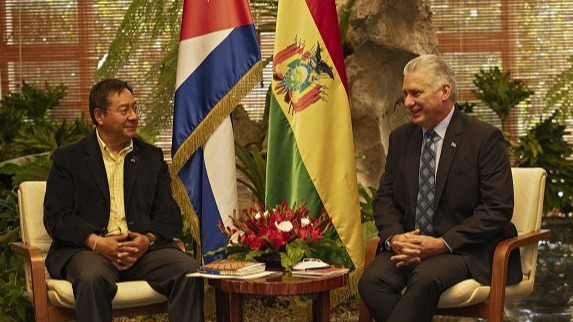
Diaz-Canel (R) received Arce in Havana. Photo: @PresidenciaCuba
By María Josefina Arce
Cuba and Bolivia met again this week in Havana as brothers. The interest of both countries to resume bilateral relations was evident, after a period marked by the 2019 coup d'état in the South American nation.
The visit to Cuba of the Bolivian president, Luis Arce, is part of the willingness to work together to enhance cooperation for the benefit of the two peoples.
This was stated by the Bolivian president, who also participated in the Cuban capital in the XX Summit of Heads of State and Government of ALBA-TCP, Bolivarian Alliance for the Peoples of Our America-People's Trade Treaty.
"I think this is a very good opportunity to strengthen our ties once again and once again show the Cuban people our willingness to help," Arce said.
The Cubans already know the spirit of solidarity of the new Bolivian government. Medical supplies and food arrived from the South American nation at a complex time due to COVID-19 and the tightening of the U.S. blockade.
During his visit, the dignitary, who assumed the presidency in November last year, held fraternal meetings with his Cuban counterpart, Miguel Díaz-Canel, Prime Minister Manuel Marrero and other important officials of the Caribbean country.
During the meetings, which were described as fruitful, it was agreed to work on various issues such as the pharmaceutical industry and biotechnology, among others.
Cooperation between the two peoples entered a higher stage with the coming to power in 2006 of the MAS, Movement Towards Socialism, which gave great importance to its links with Cuba. There were multiple branches in which the collaboration materialized, resulting in benefits for the citizens of the two peoples.
Cuban health personnel were with the Bolivians in the most intricate of this geography, helping to materialize the will of the MAS government to bring health to all, especially to the poorest families.
In the field of education, the contribution of Cuba was decisive for Bolivia to be declared an Illiteracy-Free Territory by UNESCO, the United Nations Educational, Scientific and Cultural Organization, in 2008.
Cuba and Bolivia are once again marching together along the path of respect, trust and brotherhood. They resume the solidarity and humanism that has characterized their relations under the MAS mandate in the South American nation and the commitment to work for their peoples and for all Latin America and the Caribbean.

